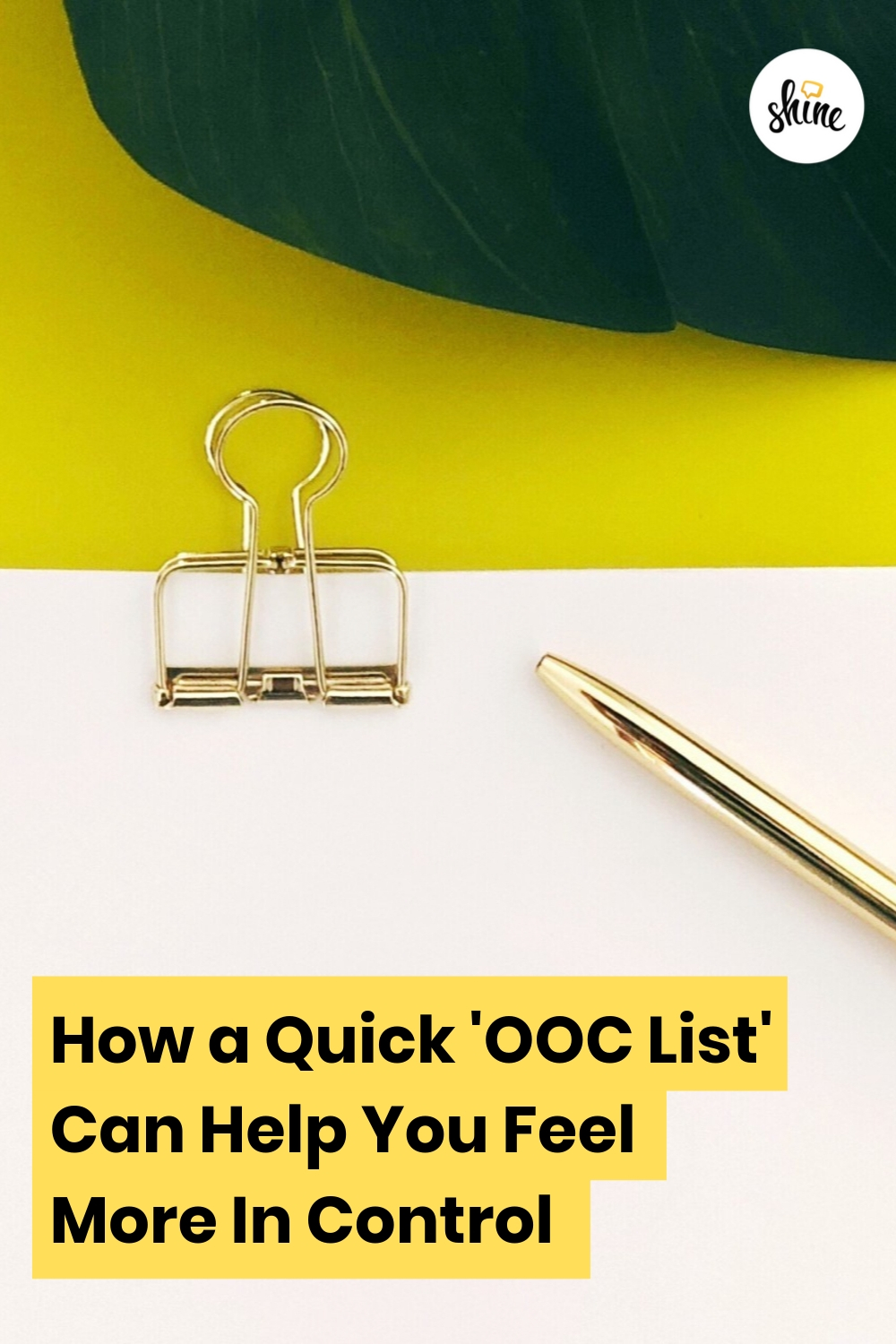How a Quick 'OOC List' Can Help You Feel More In Control
I’m standing on the train and willing the doors to close.
They did—for a second. And then they sprang right back open again.
This was already the slowest subway ride in the history of transportation, and now even the doors were sabotaging me.
Of course, I wasn’t in charge of the speed of the subway or whether or not we’d get stuck between stations. This ride was entirely out of my control—like so many things are every day.
But how I chose to react to it, on the other hand, was entirely in my control.
I could have had a nice leisurely ride and read a book and not even notice the dinging of the door—if I wasn’t running late and already frazzled. Things I can control: Giving myself plenty of time for my commute, whether or not I have something else to occupy my brain, and how I choose to react to any delays. Things I can’t control? Literally everything else, including whether the train moves.
We’re all living in an OOC world.
What’s OOC? Out Of My Control.
And the trick to getting by in this world is recognizing what we can—and can’t—control, and dealing with it accordingly. And you know the best way to deal with OOC? It’s the same as nearly everything: Make a list (and check it twice, if you want). Creating an OOC list breaking down things you can and can’t control during your day can help you refocus your energy and maybe even relieve some angst.
Creating an OOC list breaking down things you can and can’t control during your day can help you refocus your energy and maybe even relieve some angst.
It's tough to relinquish our need for control—the urge to, you know, hurtle that giant train forward with our own minds. Much of this comes from our reliance on knowing what will happen in the future—and worrying the worst scenario will unfold.
That's why Amy Morin, L.C.S.W., recommends that you ask yourself about the worst-case scenario directly. “Ask yourself what you are afraid will happen: Are you predicting a catastrophic outcome? Do you doubt your ability to cope with disappointment? Usually, the worst-case scenario isn't as tragic as you might envision," she writes. "There's a good chance you're stronger than you think.”
I love her trick on giving in to the OOC-ness of it all: “Acknowledging that you can handle the worst-case scenario can help you put your energy into more productive exercises.”
Ah ha, there’s the magic! Accepting your lack of control results in a brilliant Jedi mind trick: You actually gain more control because of your honesty.
Accepting your lack of control results in a brilliant Jedi mind trick: You actually gain more control because of your honesty.

Here are a few places to start with your OOC list—and what to do when you’re faced with a self-control trip.
“I can’t control every environment I’m in.”
Yes, you should be carrying around reusable bags and banish plastic straws forever—these types of choices relating to the environment are in your control. But other environmental factors are more personal and might not give you the oversight you need.
Maybe your cubicle mate has an hourlong conferene call every morning, right when your brain is fired up to work. You can’t control what she does, so rather than being bothered every single morning, admit that you can’t do anything about it and her routine likely won’t change. What you can do: bring in your headphones and use that time to blast your favorite soundtrack. Or co-opt an empty conference room and do your own deep work.
See what we did there? We accepted the OOC, and came up with a way to control your reaction.
“I can’t control everything my body does.”
Nothing’s worse than being sick or injured—these feelings can make you completely out of sorts and make you feel, well, helpless. If you have a headache or migraine or bad flu or lingering cold, for the most part, you’re in OOC land. So don’t beat yourself up—you didn’t make yourself get here, and focus on the parts of being sick you can control: resting, getting the right food and drink, and resting s’more. Every little positive choice you make gives you a little bit more power.
“I can’t control other people’s emotions.”
The big one! Once you firmly square away that you cannot control other people and, especially, their emotions towards you or your actions, you’re well on your way to a better place.
Looking for the silver lining, however, you can meditate and moderate how you react to someone else. You can be an active and receptive listener, and you have the ability to respond in a way that’s aligned with your own values.
“I can’t control the weather.”
Today is sunny and bright and I’m in a great mood. But, of course, it’s going to rain on Saturday. Can I control this fact? Nope. Do I want to try? Of course! Yet seeing what you can and can’t control allows you to relish the things you have in front of you—right here, right now.
Seeing what you can and can’t control allows you to relish the things you have in front of you—right here, right now.

So the next time I’m stuck on a slow-as-molasses train, that’s what I’m going to try and remember, by going back to my list and reminding myself what I can and can’t do. Some things are just OOC—out of my control—and that’s OK.
Read next: 12 Things You Can Actually Control During Your Week

Shine is supported by members like you. When you buy through links on our site, we may earn an affiliate commission. See our affiliate disclosure for more info.



